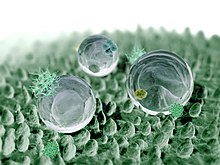
Coated fabrics are those that have undergone a coating procedure to become more functional and hold the added properties, such as cotton fabrics becoming impermeable or waterproof. Coated textiles are used in a variety of applications, including blackout curtains and the development of waterproof fabrics for raincoats. [1]
Coating
The coating is an application of chemical substances on the surface of fabric that is to be made functional or decorative. [2] Coatings use less material than other types of applications, such as exhaust or padding on stenter. [3]
History
The earliest known coated fabric is Oilcloth. Oilcloth is produced by the application of boiled linseed oil. The use of boiled oils can be traced back to 200 AD. [4]
Types
Coated fabrics can be made in a variety of ways, depending on the coating ingredients used, such as chemical and particles. Rubber, plastic, and vinyl coatings are just a few examples. [5] [6] Nanofabrics are coated with a wide range of nanoparticles to make the fabrics capable of enhanced properties such as ultrahydrophobicity, medical textiles ( antimicrobial resistance), Ultraviolet protection, and elasticity. [7] [8] [9] [10] [11]
Nanofabric coatings create fabrics whose fibers have better durability and wearability, and less coating material is needed compared to conventional finishes due to the ordered structure. [12]
Use

The applications and uses of coated fabrics are numerous.
- In manufacturing of pristine clothes. [13]
- Self cleaning fabrics with lotus effect. [14]
- PPE kits, aprons, coverall and gowns for healthcare workers usable in viral diseases such as COVID-19, [15] [16] medical textiles with protecting properties, body fluid resistance and antimicrobial surface. [17] [16]
- Coated fabrics also contribute to fire-retardant fabrics. [18] [19]
- In distinctive areas, coated fabrics are used for transportation, industrial application, geotextile, and military use. [20]
See also
References
- ^ Denny, Grace G. (Grace Goldena) (1962). Fabrics. Internet Archive. Philadelphia, Lippincott. p. 18.
- ^ "Surface coating | chemistry". Encyclopedia Britannica. Retrieved 2021-08-08.
- ^ "Using Liquid Finishes to Create Nanofabrics". www.asme.org. Retrieved 2021-08-08.
- ^ "MoreInfo-Staining and Finishing for Muzzeloading Gun Builders - Methods and Materials 1750-1850". 2013-05-30. Archived from the original on 2013-05-30. Retrieved 2021-08-08.
- ^ United States. Bureau of Agricultural Economics (1952). Survey of canvas awning fabricators. National Agricultural Library U. S. Department of Agriculture. Washington, D.C. : U.S. Dept. of Agriculture, the Bureau. p. 1.
- ^ Ambroziak, Andrzej; Kłosowski, Paweł (2014-01-15). "Mechanical properties for preliminary design of structures made from PVC coated fabric". Construction and Building Materials. 50: 74–81. doi: 10.1016/j.conbuildmat.2013.08.060. ISSN 0950-0618.
- ^ Xue, Chao-Hua; Chen, Jia; Yin, Wei; Jia, Shun-Tian; Ma, Jian-Zhong (2012-01-15). "Superhydrophobic conductive textiles with antibacterial property by coating fibers with silver nanoparticles". Applied Surface Science. 258 (7): 2468–2472. Bibcode: 2012ApSS..258.2468X. doi: 10.1016/j.apsusc.2011.10.074. ISSN 0169-4332.
- ^ Shateri-Khalilabad, Mohammad; Yazdanshenas, Mohammad E.; Etemadifar, Ali (2017-05-01). "Fabricating multifunctional silver nanoparticles-coated cotton fabric". Arabian Journal of Chemistry. 10: S2355–S2362. doi: 10.1016/j.arabjc.2013.08.013. ISSN 1878-5352.
- ^ Tsuzuki, Takuya; Wang, Xungai (2010-01-01). "Nanoparticle Coatings for UV Protective Textiles". Research Journal of Textile and Apparel. 14 (2): 9–20. doi: 10.1108/RJTA-14-02-2010-B002. hdl: 10536/DRO/DU:30020676. ISSN 1560-6074.
- ^ Xue, Chao-Hua; Jia, Shun-Tian; Zhang, Jing; Tian, Li-Qiang (2009-06-30). "Superhydrophobic surfaces on cotton textiles by complex coating of silica nanoparticles and hydrophobization". Thin Solid Films. 517 (16): 4593–4598. Bibcode: 2009TSF...517.4593X. doi: 10.1016/j.tsf.2009.03.185. ISSN 0040-6090.
- ^ Perelshtein, Ilana; Lipovsky, Anat; Perkas, Nina; Tzanov, Tzanko; Аrguirova, M.; Leseva, M.; Gedanken, Aharon (2015-07-01). "Making the hospital a safer place by sonochemical coating of all its textiles with antibacterial nanoparticles". Ultrasonics Sonochemistry. 25: 82–88. doi: 10.1016/j.ultsonch.2014.12.012. hdl: 2117/27155. ISSN 1350-4177. PMID 25577972.
- ^ "Using Liquid Finishes to Create Nanofabrics". www.asme.org. Retrieved 2021-08-08.
- ^ "Lasers help create water-repelling, light-absorbing, self-cleaning metals". New Atlas. 2015-01-21. Retrieved 2021-08-08.
- ^ "Lotus Effect - an overview | ScienceDirect Topics". www.sciencedirect.com. Retrieved 2021-08-08.
-
^ Karim1, Nazmul1; Afroj, Shaila; Lloyd, Kate; Oaten, Laura Clarke; Andreeva, Daria V.; Carr, Chris; Farmery, Andrew D.; Kim, Il-Doo; Novoselov, Kostya S. (2020).
"Sustainable Personal Protective Clothing for Healthcare Applications: A Review". ACS Nano. 14 (10): 12313–12340.
doi:
10.1021/acsnano.0c05537.
ISSN
1936-0851.
PMC
7518242.
PMID
32866368.
{{ cite journal}}: CS1 maint: numeric names: authors list ( link) - ^ a b Dehghani, Mohammad Hadi; Karri, Rama; Roy, Sharmili (2021-06-26). Environmental and Health Management of Novel Coronavirus Disease (COVID-19). Academic Press. p. 200. ISBN 978-0-323-90924-2.
- ^ Galante, Anthony J.; Haghanifar, Sajad; Romanowski, Eric G.; Shanks, Robert M. Q.; Leu, Paul W. (2020-05-13). "Superhemophobic and Antivirofouling Coating for Mechanically Durable and Wash-Stable Medical Textiles". ACS Applied Materials & Interfaces. 12 (19): 22120–22128. doi: 10.1021/acsami.9b23058. ISSN 1944-8244. PMID 32320200. S2CID 216084757.
- ^ Horrocks, A.R. (2008-01-01). "Flame retardant/resistant textile coatings and laminates". Advances in Fire Retardant Materials: 159–187. doi: 10.1533/9781845694701.1.159. ISBN 9781845692629.
- ^ Bhatnagar, Vijay Mohan (1973). Fire Retardant Coated Fabrics Formulations Handbook. Technomic Publishing Company. ISBN 978-0-87762-117-1.
- ^ Fung, W. (2002-05-23). Coated and Laminated Textiles. Woodhead Publishing. pp. 9, 247. ISBN 978-1-85573-576-7.